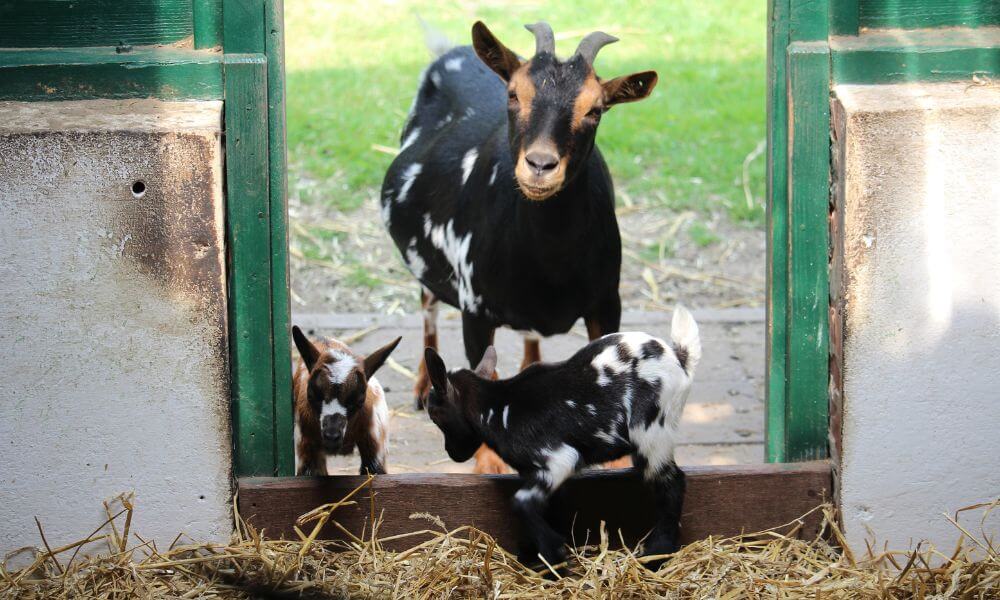Yes, it’s fine for your goat to eat its placenta after she is done giving birth. This is called placentophagy, a common practice throughout the animal kingdom which is done for a few possible reasons. Whatever reason your goat has for eating its placenta, it’s completely safe for it to do so.
There are a few steps you should take to ensure your goat safely eats its placenta, which I will get into.
But essentially, you have nothing to worry about if your goat tries to eat its placenta after labor.
But, first of all, what exactly is a placenta?

What is a placenta?
Placenta is a special organ which forms during pregnancy for the primary purpose of facilitating exchange between the mother and the developing fetus.
Both nutrients for the growing fetus but also the exchange of waste and gas.
The placenta allows the two physically separate circulations of the mother and fetus to be linked via the umbilical cord, which allows the fetus to develop and release waste and gases.
Placentas are most common in mammals and a are a more or less universal aspect of live mammal birth.
Virtually all mammals have a placenta during pregnancy.
It is also present in some marsupials and in a different form is present in the eggs of many lizards, snakes and other reptiles.
Essentially, for our purposes, a placenta is a temporary organ.
Is it safe for my goat to eat her placenta?
In short, it is completely safe for your goat to eat her placenta.
As I said, I would advise waiting with your goat for the whole period of labor in order to make sure you are present when the placenta passes.
Your goat should pass its placenta within about four hours of giving birth.
If it shows no signs of appearing after this time, it would be advisable to contact a vet.
Goats should always pass their placenta.
You will probably notice her try to take a bite almost immediately.
This is completely safe, as long as you make sure she doesn’t choke on it.
If you are there to watch over her, your goat will have no problem from eating her placenta.
But, why exactly do goats eat their placenta?
What are the benefits of eating placenta?
Animals eat their placenta for a number of possible reasons, although it can be difficult to say for certain exactly why.
There are probably several concurrent reasons.
The simplest is that the animal simply wishes to preserve the nutrients that are locked in their placenta.
It’s a big, if slightly gruesome-looking, mound of vitamins and nutrition that had up until now been feeding the kid directly from the mother’s system.
If you look at certain egg-laying reptiles and even dinosaurs, often they will lay many eggs, and eat any that do not hatch when the others do.
This is the same principle, to help preserve the nutrients.
Placenta has been shown to contain a variety of essential nutrients like fiber, protein and potassium, and even hormones like testosterone.
For this reason, it might also be the case that eating the placenta acts as a painkiller for your goat.
Labor is an extremely painful and energy-draining process.
A placenta, unpalatable as it might be to humans, just looks like a big, warm treat after a long and painful process to a goat.
Another possible reason is quite different.
When you supervise your goat’s labor, you will notice that the placenta gives off quite a distinct smell even to our relatively weak noses.
The smell of blood and internal gases and processes will be strong on the air.
So, think about problems this might cause in the wild.
Often, predators will target juveniles and newborns in herd animals as they are easier to take down.
If there is a very strong smell on the air associated with a fresh birth, there is a very good chance this will attract predators looking for the baby.
So, the idea is that a goat would instinctively eat its placenta in order to rid the smell from the air and keep predators away.
The fact that the placenta is eaten usually immediately after birth indicates a few things.
The urgency supports both the idea that it acts as a painkiller, since your goat probably wants very quick relief.
It also supports the idea of trying to ward off predators, since there is no time to waste in protecting the herd.
So, there a few possible reasons goats might eat their placenta. In humans, there are even placenta pills available, which some report have helped them with post-partum depression.
Your goat might be self-medicating in a variety of ways by eating its placenta.
To wrap up, you have absolutely nothing to worry about from your goat eating its placenta.
It’s an entirely normal and natural thing which many, many mammals and other animals do across the animal kingdom.
Why precisely animals do it is not entirely clear since there are a few very well supported positions, which simply suggests they do it for a variety of reasons and benefits.
You have nothing to fear from your goat eating its placenta and it will probably be happier for it.

First time girl mama all three babies are born. She is tired and I was cleaning up the stall door. I need to leave the placenta.?